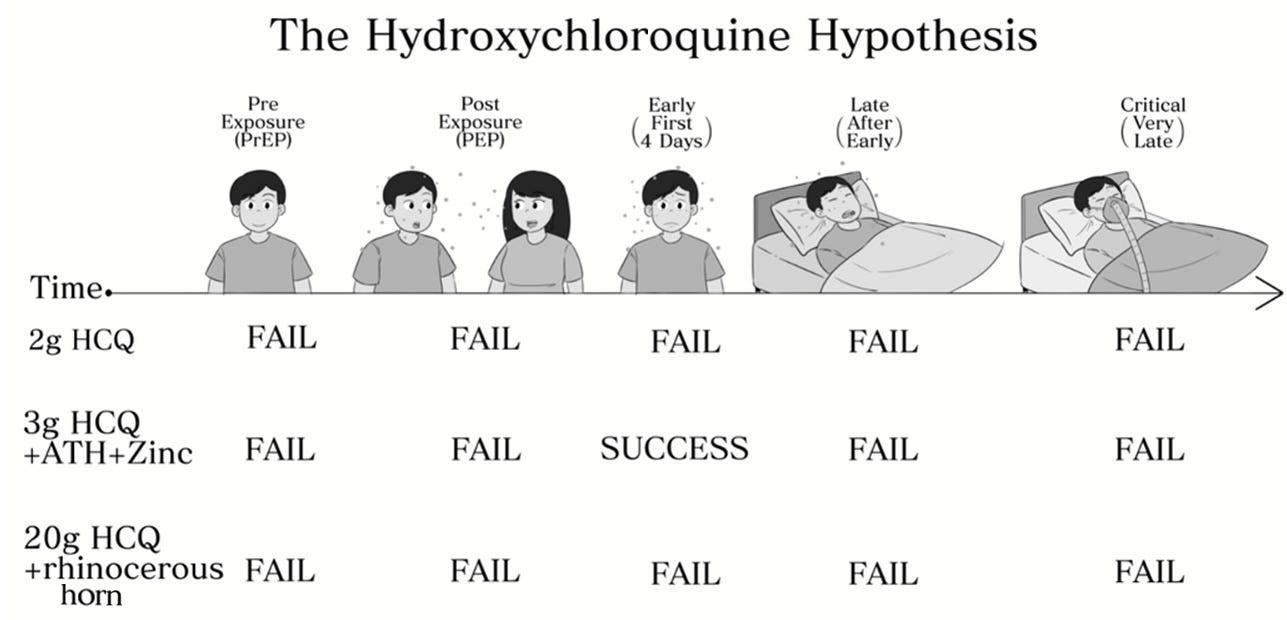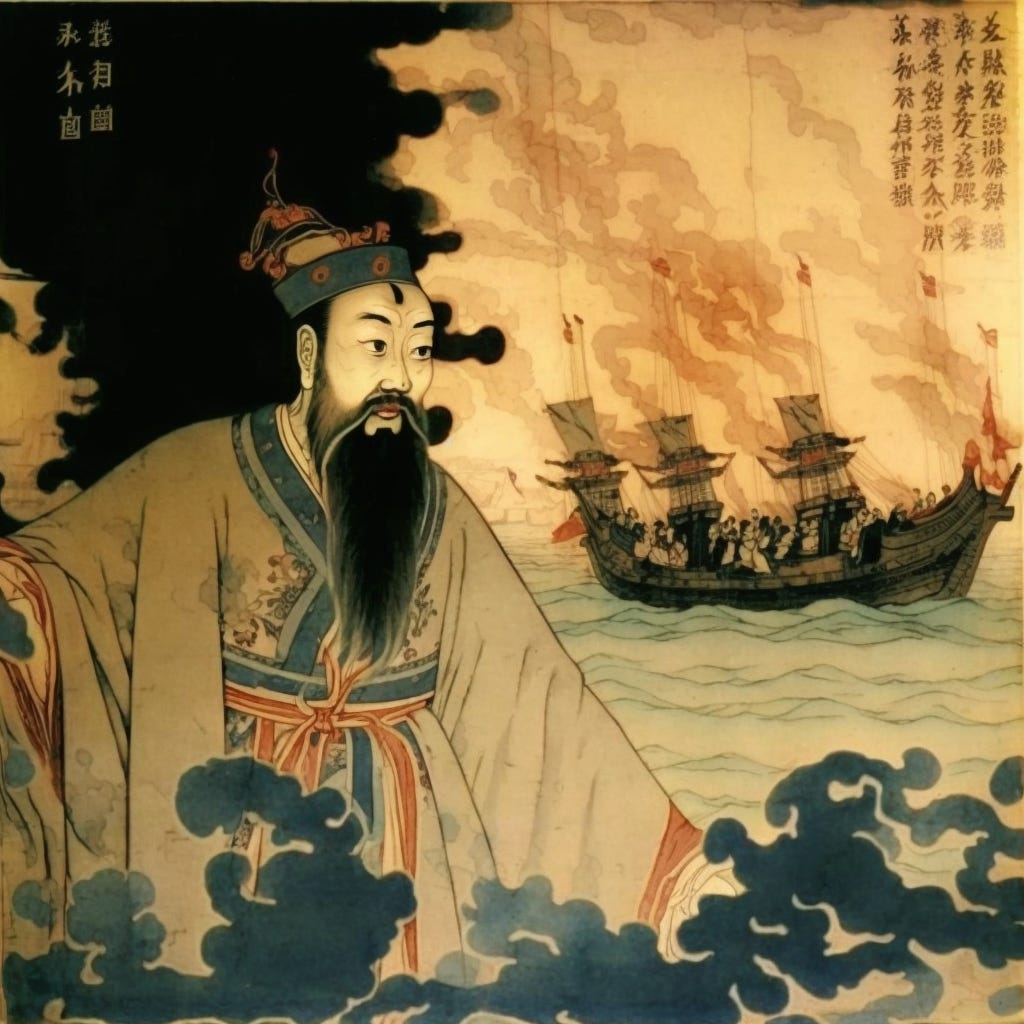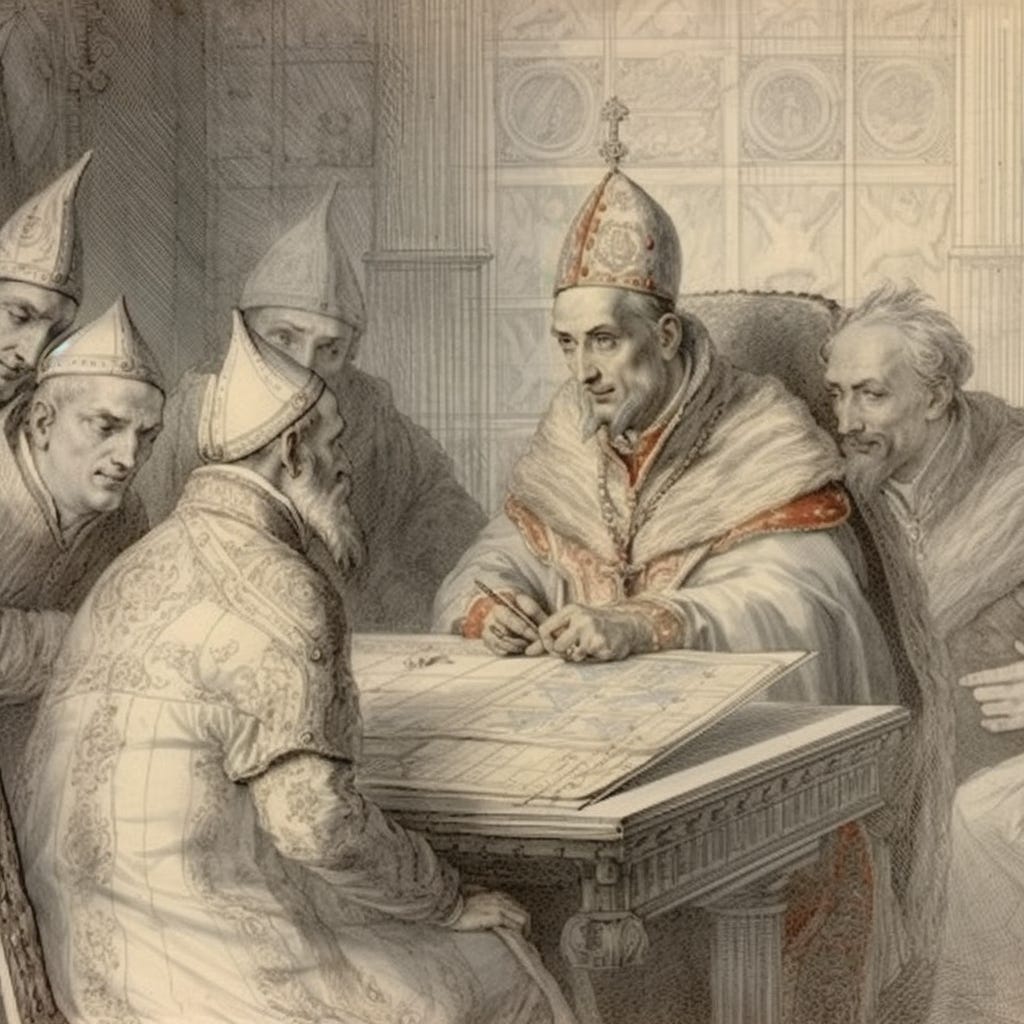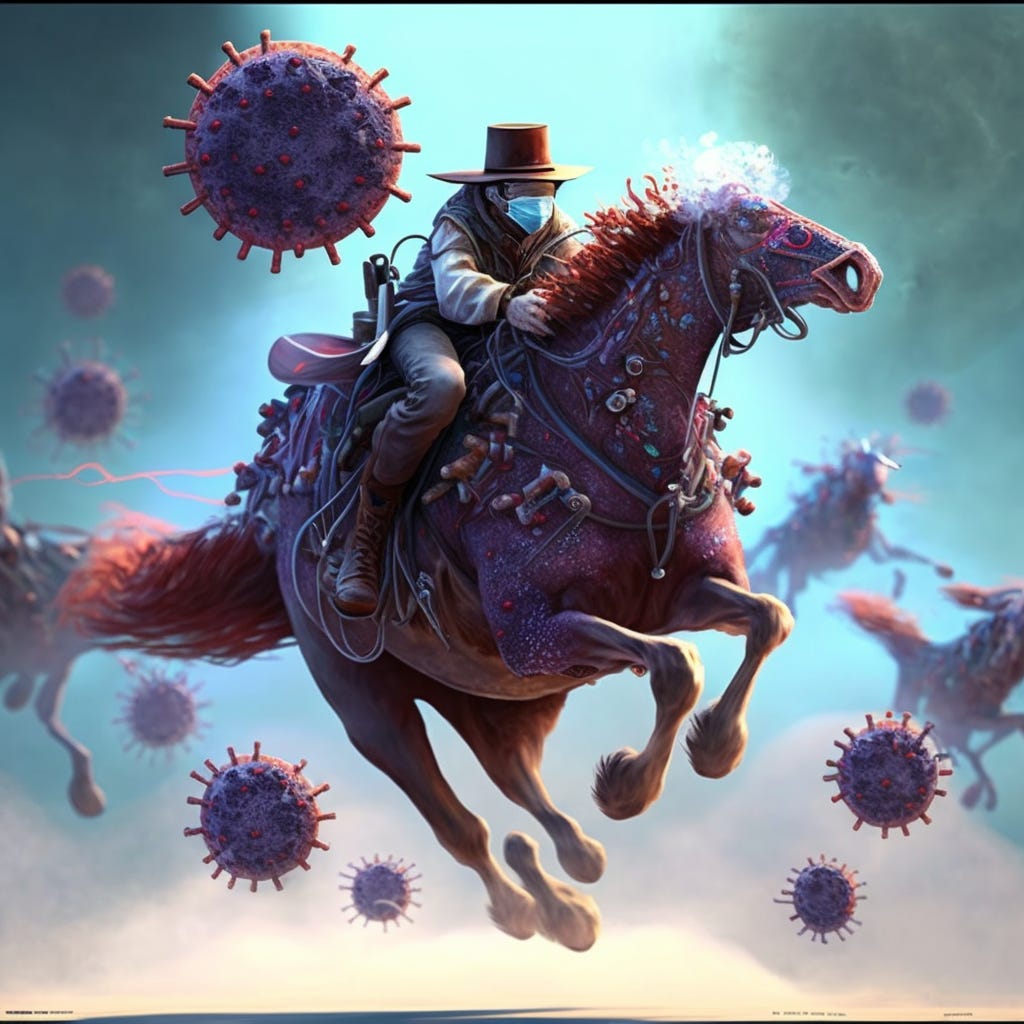“We don’t devote enough scientific research to finding a cure for jerks.” –Bill Watterson
How do we establish trust in the information we receive? How do we establish trust in experts? What is an expert, anyhow, and does the type of expertise matter? How do we keep from being fooled? If we place proxy trust in experts for what we do not or cannot understand, how do we prevent ourselves from being manipulated? What is our base epistemology? Is everything we experience as "history" merely an ongoing propaganda war, and how would we recognize it when we’re in the midst of such a Matrix?
In order to understand propaganda wars, let’s take a step back in time to the beginning—and the almost-beginning—of the era of decentralized market capitalism.
The Boats: An Oceanic Western
In 1405, still early in China’s Ming dynasty, the Yongle Emperor Zhu Di ordered the construction of the historically massive fleet of hundreds of large boats known as the Treasure Fleet. Captained by Eunuch Grand Director and trusted confidant of the emperor, Zheng He, the royal fleet embarked on seven voyages to many nations, carrying diplomats, hunting pirates and enemies of the emperor, establishing valuable trade routes, and returning with tributes from various national leaders. Crewed by more than 20,000 marines, soldiers, and assorted travelers, these ships formed a formidable floating city that traversed the coasts of Asia and beyond. The seven voyages of the Treasure Fleet spanned nearly three decades through the reigns of the Yongle, Hongxi, and Xuande emperors.
The Xuande Emperor Zhu Zhanji, faced a different world than his grandfather who set the Treasure Fleet in motion. Mongolian rivals threatened from the land, not the sea. Zhanji also faced a growing rebellion from the menacing uncle whose experienced army Zhanji defeated. Within the empire, the merchant class grew wealthier amidst a new era of international trade dominance. Not having broad enough strength to handle all fronts at once, and wanting to limit the growing power of a rising merchant class, Zhanji had most of the boats burned. Fragments of the Treasure Fleet remained for a century, but China’s brief oceanic domination of international trade ended with the fleet’s seventh voyage, which returned to port in 1433.
By the late 1400s, Portuguese captain Bartolomeu Dias led ships around the Cape of Good Hope. A few years later, countryman Vasco da Gama made his way all the way around Africa and reached the trading post of Calicut (now Calcutta), India. Thus began the ascension of European capitalism, cutting out the middlemen of both the Mediterranean and the Silk Road, the latter of which suffered from combat to the East in concert with economic starvation due to loss of control of European markets.
Europe was a different beast than China---united in Christendom under the Vatican, though ostensibly governed by elite royals under different banners, each with their own nations. The Reformation of 1517 further decentralized power by severing Vatican authority over the churches of many nations. Wealthier through trade and technology, these nations stopped sending so much tribute to the Vatican, and paid for larger standing armies of their own. The competing states of Europe had no choice but to embrace an emerging merchant class that made that independence possible. Any European nation that burned its boats (or other means of trade and production) would find itself outmatched by a wealthier neighbor that did not. In this, the world saw a new equilibrium of decentralized (at least multi-polar) competitive interests. Thanks to oceanic capitalism, Europe was the first Wild West.
Propaganda and Central Authorities
Seeking to restore its central authority, the Vatican searched for new methods by which to reassert itself more broadly over Europe. In 1622, Pope Gregory XV founded an organization of missionaries to re-establish the Catholic Church in Protestant nations of Europe. This organization, the Congregation for the Evangelization of Peoples, made use of rhetoric and political divisions in an attempt to lure communities back to Catholicism, one at a time. From its original name, the Sacred Congregation for the Propagation of the Faith, or simply Propaganda Fide, we take the word propaganda. Ultimately, the Vatican’s propaganda campaign failed, and decentralized Europe grew stronger through the Age of Enlightenment and beyond. At least, that's what the history books tell us. But who can really say who pulls who's strings?
Powerful authorities design hierarchies that reduce competition within their rule. They seek immortality, of blood lines if not in flesh. Historically, this has involved the raising of administrative classes with little ability to transfer generational wealth, such as with eunuchs in many civilizations. When such a regime sees a new power emerging, it may simply burn the boats. When that option is unavailable, propaganda campaigns have often limited reductions in power, and slowed their demise. In a few cases, such information warfare has tipped scales between competing rulers. While disinformation campaigns are rarely sufficient to discombobulate a foe of superior or rapidly growing strength, they often succeed in suppressing competition before it gains steam. In modern times, they are often employed by governments, corporations, or wealthy individuals, sometimes branded more sympathetically as “public relations” or “lobbying” efforts. And perhaps authorities, seeing the end of the dollar era, began establishing a new, modernized eunuch class through medicalized gender deformity.

This is enough to make a rational mind wonder if the 2012 legalization of gay marriage in the U.S. was largely about delivering monetary support for a growing array of relationships that do not result in children. Aside from the monetary benefits, why would anyone even care about state sanctioning of their relationship commitments?
The Pharmatrix
Why should we expect the modus operandi of the modern pharmaceutical industry, the central corporate-led power entangled in almost all commercial medicine, to be free of the game of power centralization?
In the 17th century, pharmacists sold a handful of worthwhile remedies such as cinchona extract, but often concocted and sold dubious elixirs which either harmed patients or drugged their symptoms without curing the root cause. Some charlatans added snake venom to their liniments, hence the term snake oil, a catch-all for pseudoscientific or poisonous medicine. To entice customers, pharmacists sought (and paid for) royal approval for their potions, which came to be known as medical patents. Historically, the monopoly power behind medical patents ensured great profits for pharmacists, whether or not the patented remedies helped anyone. When they did not, the pharmacist could direct redresses to the crown.
Through centuries of refinement of the patent based, monopoly-driven profit mechanism, pharmaceutical companies have maintained such a relationship with governments that they employ the world’s largest lobby to design their layer of the Matrix. This lobby spends hundreds of millions of dollars annually just in the United States, and more around the world. Billions of dollars spent in the political sphere over decades ensure that the pharmaceutical industry has the ears of legislatures and central involvement in every major health issue. Out of the 30 largest health care lobbying organizations, the majority are run by Big Pharma. There are 2.7 pharmaceutical and health products lobbyists for each member of Congress. The regulatory and governing process is nothing more than one grand illusion—smoke and mirrors in Washington, D.C.
At least sixteen members of the COVID-19 Treatment Guidelines Panel that was headed by former U.S. Vice President Mike Pence had financial ties to pharmaceutical companies, and nine of those had ties with just one company: Gilead Sciences. Five others are doctors of pharmacy, and many of the rest are regulatory insiders seasoned through an era in which Big Pharma seems to have had a hand in every legislative act affecting them, even going so far as to block a bill designed to put a lid on the opioid addiction crisis that ravaged North America in the first part of the twenty-first century. It is likely that additional members of the COVID-19 Treatment Panel also benefit directly or indirectly from lavish Big Pharma spending—not to mention the trillions of dollars spent due to the declaration of a pandemic and state of emergency in 2020.
According to Ars Technica, Big Pharma spends $30 billion each year on medical marketing, with 68% going to doctors and other health care professionals, aligning incentives. Another $6 billion gets spent marketing for prescription drugs, with limited oversight. And that was for 2018, prior to the new normal. The pharmaceutical industry pours billions more into medical schools; sponsoring courses and seminars, donating [the right] textbooks [that steer medicine toward pharmacological solutions], and funding research studies (for better or for worse). Predictably, research has demonstrated that Big Pharma funded studies have a systematic slant in results. The result is a strange and fantastical dystopia of biotechnological banditry. This is how we get stories such as two different teams at two different companies (Moderna and Pfizer, both) coincidentally reaching the point at which each could independently conjure the blueprints for a vaccine using a technology that had never worked safely—over a single weekend after the release of the SARS-CoV-2 genetic sequence.
The Memory Holing of the Hydroxychloroquine Story
Most everyone has already forgotten how it happened. To hundreds of millions of Americans, the "failure" of hydroxychloroquine (HCQ) is written history. There was no media available to propagate the news (not even much in the Medical Freedom Movement) when the Harvard School for Public Health released a meta-analysis declaring that, by usual standards of Biomedical Statistics (not that such standards are the best rubric for the holistic assessment of the evidence), HCQ effectively prevents the initiation or progression of COVID-19.
After having reviewed the available evidence, we might wonder why so many people think the case is closed on the HCQ Hypothesis, or oppose it with little understanding of the evidence.

Most certainly, we should wonder why people who should know better might stand in the way. And there is no one answer. Most of them do not suffer from psychosis. We know from the study of Asch conformity experiments that some people go along for a pat on the head, others to avoid social punishment, and for yet others there is a distortion of perception. Some people are simply hired into industries of complex information because it seems unlikely that they will ever put two and two together to equal something other than five. But at the end of the day, no matter how it happened, all of these people can look a whole lot alike. That's a feature, not a bug.
We may not know who the emperor is who orders the experiments, but we know how much money is at stake. All of it. While it is possible that the memory holing of HCQ was due to an array of aligned interests, any number of people could have given the game away. This is suggestive of the existence of a singular emperor, though we cannot know for certain.
Big Pharma has every reason to suppress some of the cheapest and most effective medications in human history, perhaps not only for the profits reaped during this pandemic, but also for the health of the Matrix itself. If people recognized that they could achieve better lives without paying steep taxes that fund the Matrix itself, they would begin to find the exits. If the potential for one plant, if not others, to provide safe, inexpensive therapy for many of the world’s most serious medical ailments threatens the Pharmatrix, that particular mafia family might fall—and with it the whole Matrix. In order to continue to act as if they still have deep pockets to fight this war, they need to tap into a host of political allies along the way. Just as with the banking sector, the mafias must consolidate. Perhaps there was no emperor until the dollar crisis arose, but that the monetary crisis that began (at least acutely) in 2007 demanded one.
Note that we make no claim that Big Pharma directed a propaganda campaign to crush perception of the efficacy of HCQ. Powerful though Big Pharma may be, they are the corporate boats. They are not the central authorities. The truth is that while we often identify the participation of certain corporations, governments, and other institutions as role players in the grand deceptions, these are themselves simply corruptible organizations and institutions steered by flawed human beings. They operate in a landscape engineered over centuries by powerful agents who work in the dark. We should assume that the grand sum of psychological and information warfare at play obscures even that person or persons who crafted the plandemonium, and gave the orders. At the end of the day, it's no wonder that some people's imaginations have given way to the notion that all of this is under the direction of aliens. At least those people are seeing the glitches in the Matrix.
The Last Mistake
You may think that the emperor or central authorities are a whole lot further ahead of the rest of us with their understanding of technology. That is precisely what they want for you to think with their talk of ending aging, artificial intelligence, and advanced computer chips with processing power that is primarily important to asymmetric surveillance technology. Their real advantages are in the information game. But each new generation of technology allows for a solution to that problem. Remember the lesson from fifteenth century China. Don't burn the boats. Learn and encourage others to educate themselves on new technologies. That's the surest way to decentralize power, and a safer mission than burning it all down.
All uncited images in this article, including the one just above, were generated by artificial intelligence software.














Pfizer market cap is $228bn today. It sounds a lot but it’s only 9% of the value of Apple. Why do we allow this relative minnow to do so much societal harm?
I'm not answering these questions flippantly. I've spent a lot of time thinking about these questions. This is the best I can come up with for now.
(Haven't read the full article yet, need to go to a meeting now, but those first questions really compelled me to comment :-)
-----
> How do we establish trust in experts?
We keep meticulous detailed records of their predictions.
> What is an expert, anyhow, and does the type of expertise matter?
Someone who truly understands "cause and effect" and is able to make accurate predictions based on their knowledge (and is able to explain it to others).
They gain "expert" status when many of their predictions turn out to be true.
> How do we keep from being fooled?
By keeping good records and reviewing them often.
> If we place proxy trust in experts for what we do not or cannot understand, how do we prevent ourselves from being manipulated?
Having open and transparent discussions on their predictions before they come to pass and after they come to pass.